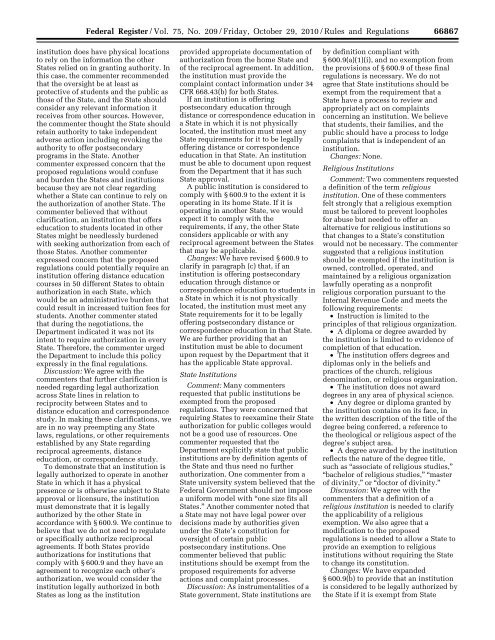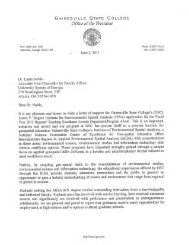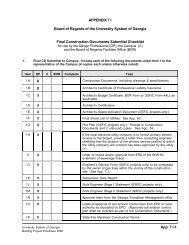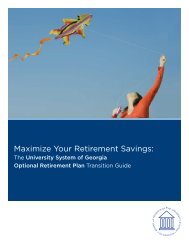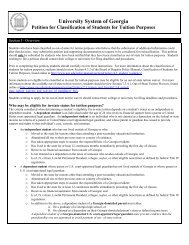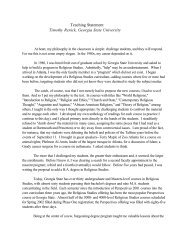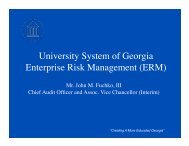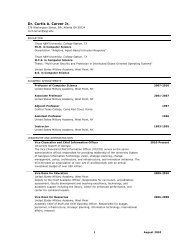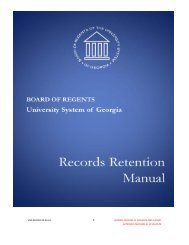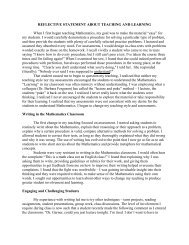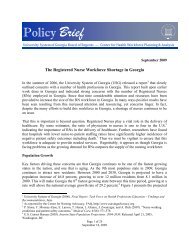66866 Federal Register / Vol. 75, No. 209 / Friday, October 29, 2010 / Rules and RegulationsWReier-Aviles on DSKGBLS3C1PROD with RULES2the State Attorney General as well asother appropriate State <strong>of</strong>ficials. A Statemay choose to have a single agency or<strong>of</strong>ficial handle complaints regardinginstitutions or may use a combination <strong>of</strong>agencies and State <strong>of</strong>ficials. All relevant<strong>of</strong>ficials or agencies must be included inan institution’s institutional informationunder § 668.43(b). Directly relying on aninstitution’s accrediting agency wouldnot comply with § 600.9(a)(1) <strong>of</strong> thesefinal regulations; however, to the extenta complaint relates to an institution’squality <strong>of</strong> education or other issueappropriate to consideration by aninstitution’s accrediting agency, a Statemay refer a complaint to theinstitution’s accrediting agency forresolution. We do not believe it isnecessary to prescribe memoranda <strong>of</strong>understanding or similar mechanisms ifa State chooses to rely on aninstitution’s accrediting agency as theState remains responsible for theappropriate resolution <strong>of</strong> a complaint.Section 600.9(a)(1) requires aninstitution to be authorized by a State,thus providing an additional check oninstitutional integrity; however, we donot believe there are inadequate checkson State <strong>of</strong>ficials and agencies as theyare subject to audit, review, and Statelegislative action.We do not agree with the commentersthat proposed § 600.9(b)(3) wouldunnecessarily use State resources, beimpractical, or be chaotic to administer.There are complaints that only a Statecan appropriately handle, includingenforcing any applicable State law orregulations. We do not agree that publicinstitutions should be exempt from thisrequirement as a complainant must havea process, independent <strong>of</strong> anyinstitution—public or private, to havehis or her complaint considered by theState. The State is not permitted to relyon institutional complaint andsanctioning processes in resolvingcomplaints it receives as these do notprovide the necessary independentprocess for reviewing a complaint. AState may, however, monitor aninstitution’s complaint resolutionprocess to determine whether it isaddressing the concerns that are raisedwithin it.We do not agree with the suggestionsthat the <strong>Department</strong>’s Student LoanOmbudsman is an appropriatealternative to a State complaintsprocess. The Ombudsman is charged,under the HEA, with the informalresolution only <strong>of</strong> complaints byborrowers under the title IV, HEA loanprograms. By comparison, a State’scomplaint resolution process wouldcover the breadth <strong>of</strong> issues that ariseunder its laws or regulations.Changes: We have amended proposed§ 668.43(b) to provide that an institutionmust make available to a student orprospective student contact informationfor filing complaints with its accreditorand with its State approval or licensingentity and any other relevant State<strong>of</strong>ficial or agency that wouldappropriately handle a student’scomplaint.Comment: One commenter believedthat proposed § 668.43(b) under whichan institution must provide to studentsand prospective students the contactinformation for filing complaints withthe institution’s State approval orlicensing entity should make allowancefor situations in which a State has noprocess for complaints, or defers to theaccrediting agency to receive andresolve complaints. Another commenterbelieved that, in the case <strong>of</strong> distanceeducation, the institution should beresponsible for responding tocomplaints. Instead <strong>of</strong> providingstudents and prospective students,under proposed § 668.43(b), the contactinformation for filing complaints withthe institution’s accrediting agency andState approval or licensing entity, thecommenter recommended that theinstitution provide students with theinstitution’s name, location, and Website to file complaints.Discussion: We do not agree thatproposed § 668.43(b) needs to makeallowance for an institution in a Statewithout a process for complaints, sinceevery State is charged with enforcing itsown laws and no institution is exemptfrom complying with State laws. If nocomplaint process existed, theinstitution would not be considered tobe legally authorized. With respect to aninstitution <strong>of</strong>fering distance educationprograms, the institution must provide,under § 668.43(b), not only the contactinformation for the State or States inwhich it is physically located, but alsothe contact information for States inwhich it provides distance education tothe extent that the State has anylicensure or approval processes for aninstitution outside the State providingdistance education in the State.Changes: None.Reciprocity and Distance <strong>Education</strong>Comment: In general, commentersexpressed concerns regarding legalauthorization by a State incircumstances where an institution isphysically located across State lines aswell as when an institution is operatingin another State from its physicallocation through distance education oronline learning. One commenter urgedthe <strong>Department</strong> to include clarifyinglanguage regarding a State’s ability toVerDate Mar2010 14:10 Oct 28, 2010 Jkt 223001 PO 00000 Frm 00036 Fmt 4701 Sfmt 4700 E:\FR\FM\29OCR2.SGM 29OCR2rely on other States’ authorization in thefinal regulation rather than in thepreamble. Several commentersrequested that the <strong>Department</strong> limit theState authorization requirement in§ 600.9 to the State in which theinstitution is physically located. Onecommenter believed that a State shouldonly be allowed to rely on anotherState’s determination if the school hasno physical presence in the State andthe other State’s laws, authority, andoversight are at least as protective <strong>of</strong>students and taxpayers. One commenterasked whether the phrase ‘‘the State inwhich the institution operates’’ is thesame as ‘‘where the institution isdomiciled’’. The commenter asked forclarification <strong>of</strong> the meaning <strong>of</strong> ‘‘operate’’including whether it means whereonline students are located, wherestudent recruiting occurs, where aninstructor is located, or wherefundraising activity is undertaken. Onecommenter requested that the<strong>Department</strong> clarify and affirm thatreciprocity agreements that existbetween States with respect to publicinstitutions operating campuses orprograms in multiple States are notimpacted by these regulations. Anothercommenter believed that the<strong>Department</strong> should issue regulationsrather than merely provide in thepreamble <strong>of</strong> the NPRM that a State isallowed to enter into an agreement withanother State. One commenter askedwhether an institution that operates inmore than one State can rely on anauthorization from a State that does notmeet the authorization requirements.One commenter urged the <strong>Department</strong>to clarify that States may rely on theauthorization by other States,particularly as it relates to distanceeducation. One commenter stated thatthe proposed regulations would behighly problematic for students whotransfer between different States.Another commenter feared that largeproprietary schools that are regional ornational in scope would likely lobbyStates to turn over their oversight toanother State where laws, regulations,and oversight are more lax. Anothercommenter was concerned that forpr<strong>of</strong>itinstitutions may lobby a State torelinquish its responsibilities to a State<strong>of</strong> those institutions’ choosing. Thissituation could result in a State withlittle regulation that is home to a largefor-pr<strong>of</strong>it institution actually controllingpolicies in many States where thecorporation does business. Onecommenter suggested that if aninstitution is not physically located in aState, the State could enter into anagreement with other States where the
Federal Register / Vol. 75, No. 209 / Friday, October 29, 2010 / Rules and Regulations66867WReier-Aviles on DSKGBLS3C1PROD with RULES2institution does have physical locationsto rely on the information the otherStates relied on in granting authority. Inthis case, the commenter recommendedthat the oversight be at least asprotective <strong>of</strong> students and the public asthose <strong>of</strong> the State, and the State shouldconsider any relevant information itreceives from other sources. However,the commenter thought the State shouldretain authority to take independentadverse action including revoking theauthority to <strong>of</strong>fer postsecondaryprograms in the State. Anothercommenter expressed concern that theproposed regulations would confuseand burden the States and institutionsbecause they are not clear regardingwhether a State can continue to rely onthe authorization <strong>of</strong> another State. Thecommenter believed that withoutclarification, an institution that <strong>of</strong>ferseducation to students located in otherStates might be needlessly burdenedwith seeking authorization from each <strong>of</strong>those States. Another commenterexpressed concern that the proposedregulations could potentially require aninstitution <strong>of</strong>fering distance educationcourses in 50 different States to obtainauthorization in each State, whichwould be an administrative burden thatcould result in increased tuition fees forstudents. Another commenter statedthat during the negotiations, the<strong>Department</strong> indicated it was not itsintent to require authorization in everyState. Therefore, the commenter urgedthe <strong>Department</strong> to include this policyexpressly in the final regulations.Discussion: We agree with thecommenters that further clarification isneeded regarding legal authorizationacross State lines in relation toreciprocity between States and todistance education and correspondencestudy. In making these clarifications, weare in no way preempting any Statelaws, regulations, or other requirementsestablished by any State regardingreciprocal agreements, distanceeducation, or correspondence study.To demonstrate that an institution islegally authorized to operate in anotherState in which it has a physicalpresence or is otherwise subject to Stateapproval or licensure, the institutionmust demonstrate that it is legallyauthorized by the other State inaccordance with § 600.9. We continue tobelieve that we do not need to regulateor specifically authorize reciprocalagreements. If both States provideauthorizations for institutions thatcomply with § 600.9 and they have anagreement to recognize each other’sauthorization, we would consider theinstitution legally authorized in bothStates as long as the institutionprovided appropriate documentation <strong>of</strong>authorization from the home State and<strong>of</strong> the reciprocal agreement. In addition,the institution must provide thecomplaint contact information under 34CFR 668.43(b) for both States.If an institution is <strong>of</strong>feringpostsecondary education throughdistance or correspondence education ina State in which it is not physicallylocated, the institution must meet anyState requirements for it to be legally<strong>of</strong>fering distance or correspondenceeducation in that State. An institutionmust be able to document upon requestfrom the <strong>Department</strong> that it has suchState approval.A public institution is considered tocomply with § 600.9 to the extent it isoperating in its home State. If it isoperating in another State, we wouldexpect it to comply with therequirements, if any, the other Stateconsiders applicable or with anyreciprocal agreement between the Statesthat may be applicable.Changes: We have revised § 600.9 toclarify in paragraph (c) that, if aninstitution is <strong>of</strong>fering postsecondaryeducation through distance orcorrespondence education to students ina State in which it is not physicallylocated, the institution must meet anyState requirements for it to be legally<strong>of</strong>fering postsecondary distance orcorrespondence education in that State.We are further providing that aninstitution must be able to documentupon request by the <strong>Department</strong> that ithas the applicable State approval.State InstitutionsComment: Many commentersrequested that public institutions beexempted from the proposedregulations. They were concerned thatrequiring States to reexamine their Stateauthorization for public colleges wouldnot be a good use <strong>of</strong> resources. Onecommenter requested that the<strong>Department</strong> explicitly state that publicinstitutions are by definition agents <strong>of</strong>the State and thus need no furtherauthorization. One commenter from aState university system believed that theFederal Government should not imposea uniform model with ‘‘one size fits allStates.’’ Another commenter noted thata State may not have legal power overdecisions made by authorities givenunder the State’s constitution foroversight <strong>of</strong> certain publicpostsecondary institutions. Onecommenter believed that publicinstitutions should be exempt from theproposed requirements for adverseactions and complaint processes.Discussion: As instrumentalities <strong>of</strong> aState government, State institutions areVerDate Mar2010 14:10 Oct 28, 2010 Jkt 223001 PO 00000 Frm 00037 Fmt 4701 Sfmt 4700 E:\FR\FM\29OCR2.SGM 29OCR2by definition compliant with§ 600.9(a)(1)(i), and no exemption fromthe provisions <strong>of</strong> § 600.9 <strong>of</strong> these finalregulations is necessary. We do notagree that State institutions should beexempt from the requirement that aState have a process to review andappropriately act on complaintsconcerning an institution. We believethat students, their families, and thepublic should have a process to lodgecomplaints that is independent <strong>of</strong> aninstitution.Changes: None.Religious InstitutionsComment: Two commenters requesteda definition <strong>of</strong> the term religiousinstitution. One <strong>of</strong> these commentersfelt strongly that a religious exemptionmust be tailored to prevent loopholesfor abuse but needed to <strong>of</strong>fer analternative for religious institutions sothat changes to a State’s constitutionwould not be necessary. The commentersuggested that a religious institutionshould be exempted if the institution isowned, controlled, operated, andmaintained by a religious organizationlawfully operating as a nonpr<strong>of</strong>itreligious corporation pursuant to theInternal Revenue Code and meets thefollowing requirements:• Instruction is limited to theprinciples <strong>of</strong> that religious organization.• A diploma or degree awarded bythe institution is limited to evidence <strong>of</strong>completion <strong>of</strong> that education.• The institution <strong>of</strong>fers degrees anddiplomas only in the beliefs andpractices <strong>of</strong> the church, religiousdenomination, or religious organization.• The institution does not awarddegrees in any area <strong>of</strong> physical science.• Any degree or diploma granted bythe institution contains on its face, inthe written description <strong>of</strong> the title <strong>of</strong> thedegree being conferred, a reference tothe theological or religious aspect <strong>of</strong> thedegree’s subject area.• A degree awarded by the institutionreflects the nature <strong>of</strong> the degree title,such as ‘‘associate <strong>of</strong> religious studies,’’‘‘bachelor <strong>of</strong> religious studies,’’ ‘‘master<strong>of</strong> divinity,’’ or ‘‘doctor <strong>of</strong> divinity.’’Discussion: We agree with thecommenters that a definition <strong>of</strong> areligious institution is needed to clarifythe applicability <strong>of</strong> a religiousexemption. We also agree that amodification to the proposedregulations is needed to allow a State toprovide an exemption to religiousinstitutions without requiring the Stateto change its constitution.Changes: We have expanded§ 600.9(b) to provide that an institutionis considered to be legally authorized bythe State if it is exempt from State
- Page 1 and 2: Friday,October 29, 2010Part IIDepar
- Page 3 and 4: Federal Register / Vol. 75, No. 209
- Page 6 and 7: 66836 Federal Register / Vol. 75, N
- Page 8 and 9: 66838 Federal Register / Vol. 75, N
- Page 10 and 11: WReier-Aviles on DSKGBLS3C1PROD wit
- Page 12 and 13: 66842 Federal Register / Vol. 75, N
- Page 14 and 15: 66844 Federal Register / Vol. 75, N
- Page 16 and 17: WReier-Aviles on DSKGBLS3C1PROD wit
- Page 18 and 19: 66848 Federal Register / Vol. 75, N
- Page 20 and 21: 66850 Federal Register / Vol. 75, N
- Page 22 and 23: WReier-Aviles on DSKGBLS3C1PROD wit
- Page 24 and 25: 66854 Federal Register / Vol. 75, N
- Page 26 and 27: WReier-Aviles on DSKGBLS3C1PROD wit
- Page 28 and 29: 66858 Federal Register / Vol. 75, N
- Page 30 and 31: 66860 Federal Register / Vol. 75, N
- Page 32 and 33: 66862 Federal Register / Vol. 75, N
- Page 34 and 35: 66864 Federal Register / Vol. 75, N
- Page 38 and 39: WReier-Aviles on DSKGBLS3C1PROD wit
- Page 40 and 41: WReier-Aviles on DSKGBLS3C1PROD wit
- Page 42 and 43: 66872 Federal Register / Vol. 75, N
- Page 44 and 45: WReier-Aviles on DSKGBLS3C1PROD wit
- Page 46 and 47: WReier-Aviles on DSKGBLS3C1PROD wit
- Page 48 and 49: WReier-Aviles on DSKGBLS3C1PROD wit
- Page 50 and 51: 66880 Federal Register / Vol. 75, N
- Page 52 and 53: WReier-Aviles on DSKGBLS3C1PROD wit
- Page 54 and 55: 66884 Federal Register / Vol. 75, N
- Page 56 and 57: 66886 Federal Register / Vol. 75, N
- Page 58 and 59: WReier-Aviles on DSKGBLS3C1PROD wit
- Page 60 and 61: WReier-Aviles on DSKGBLS3C1PROD wit
- Page 62 and 63: WReier-Aviles on DSKGBLS3C1PROD wit
- Page 64 and 65: WReier-Aviles on DSKGBLS3C1PROD wit
- Page 66 and 67: WReier-Aviles on DSKGBLS3C1PROD wit
- Page 68 and 69: WReier-Aviles on DSKGBLS3C1PROD wit
- Page 70 and 71: WReier-Aviles on DSKGBLS3C1PROD wit
- Page 72 and 73: 66902 Federal Register / Vol. 75, N
- Page 74 and 75: WReier-Aviles on DSKGBLS3C1PROD wit
- Page 76 and 77: WReier-Aviles on DSKGBLS3C1PROD wit
- Page 78 and 79: 66908 Federal Register / Vol. 75, N
- Page 80 and 81: WReier-Aviles on DSKGBLS3C1PROD wit
- Page 82 and 83: 66912 Federal Register / Vol. 75, N
- Page 84 and 85: WReier-Aviles on DSKGBLS3C1PROD wit
- Page 86 and 87:
66916 Federal Register / Vol. 75, N
- Page 88 and 89:
WReier-Aviles on DSKGBLS3C1PROD wit
- Page 90 and 91:
WReier-Aviles on DSKGBLS3C1PROD wit
- Page 92 and 93:
WReier-Aviles on DSKGBLS3C1PROD wit
- Page 94 and 95:
66924 Federal Register / Vol. 75, N
- Page 96 and 97:
WReier-Aviles on DSKGBLS3C1PROD wit
- Page 98 and 99:
66928 Federal Register / Vol. 75, N
- Page 100 and 101:
WReier-Aviles on DSKGBLS3C1PROD wit
- Page 102 and 103:
66932 Federal Register / Vol. 75, N
- Page 104 and 105:
WReier-Aviles on DSKGBLS3C1PROD wit
- Page 106 and 107:
66936 Federal Register / Vol. 75, N
- Page 108 and 109:
66938 Federal Register / Vol. 75, N
- Page 110 and 111:
66940 Federal Register / Vol. 75, N
- Page 112 and 113:
66942 Federal Register / Vol. 75, N
- Page 114 and 115:
66944 Federal Register / Vol. 75, N
- Page 116 and 117:
66946 Federal Register / Vol. 75, N
- Page 118 and 119:
WReier-Aviles on DSKGBLS3C1PROD wit
- Page 120 and 121:
WReier-Aviles on DSKGBLS3C1PROD wit
- Page 122 and 123:
WReier-Aviles on DSKGBLS3C1PROD wit
- Page 124 and 125:
66954 Federal Register / Vol. 75, N
- Page 126 and 127:
WReier-Aviles on DSKGBLS3C1PROD wit
- Page 128 and 129:
66958 Federal Register / Vol. 75, N
- Page 130 and 131:
66960 Federal Register / Vol. 75, N
- Page 132 and 133:
WReier-Aviles on DSKGBLS3C1PROD wit
- Page 134 and 135:
WReier-Aviles on DSKGBLS3C1PROD wit
- Page 136 and 137:
WReier-Aviles on DSKGBLS3C1PROD wit
- Page 138 and 139:
66968 Federal Register / Vol. 75, N
- Page 140 and 141:
66970 Federal Register / Vol. 75, N
- Page 142 and 143:
66972 Federal Register / Vol. 75, N
- Page 144 and 145:
66974 Federal Register / Vol. 75, N


